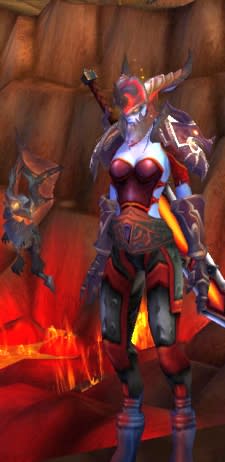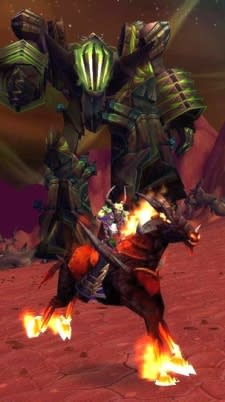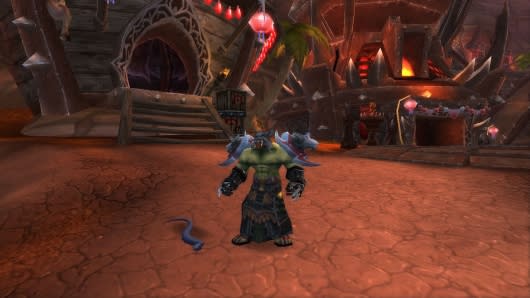The Soapbox: World of Warcraft isn't back, and that's fine
So. That Warlords of Draenor, huh?
To take the narrative that a lot of people have constructed, World of Warcraft has been sort of floundering for the past few years. It released one expansion (Cataclysm) that consistently ranks as the worst expansion in the game's history, coming behind the launch game, The Burning Crusade, and Alganon. Then it released another one that turned out to actually be pretty good but with a premise that turned a lot of people off right out of the gate. Mists of Pandaria's quality doesn't matter in the face of the game losing five million subscriptions in three years.
But then, Warlords of Draenor was announced, and suddenly hope returned to the faithful. There's this thought that the game has suddenly returned from the brink, that Blizzard hit the big red button labeled "Save World of Warcraft" and the game will be catapulted back into prominence once again. Except that I think that portion of the story isn't just premature -- it's making a stab in the dark about a game that isn't back and can't, in fact, be back.

Keep in mind, I'm not saying that WoW is doomed and it's just going to keep shedding subscribers or that no one will come back for Warlords or anything like that. Heck, I decided to give the game another shot after leaving three years ago, obviously it's an interesting premise. But WoW has hit its apex already, we've seen the impact it had, and now the landscape is shifting yet again.
Explaining what a big deal WoW was is harder to do than it might seem. It was released in 2004, and so much of what it does now seems downright pedestrian. What's hard to understand is that it did a lot of things that no other game before had done in quite the same way because those things have had such a huge impact on the industry as a whole that we look at them as obvious.
WoW launched in a time when games did not expect you to use quests from the start of the game to the level cap and certainly didn't expect you to do so solo. Five members per party was small, and the idea that said party consisted of three roles wasn't the standard. Color-coded item quality, UI mods built into the game's structure, a lot of what we think of as standard hotbar combat... these things existed before WoW in various forms, but certainly weren't brought together in the same way, and they weren't popularized.
Playing contemporaries like City of Heroes and Guild Wars makes it clear that these innovations were not something that Blizzard had a monopoly on. But World of Warcraft is what struck a chord. Maybe it was the art style, maybe it was the setting, maybe it was the fine-tuning of the mechanics, maybe it was just the fact that people really liked games that started with the 23rd letter of the alphabet. The game exploded in popularity.
Now we have games that are such obvious successors to World of Warcraft that some people scoff at new games as clones. The game has been parodied and referenced in pop culture. The standards for a game's success have changed as those millions of WoW players investigate other games. WoW brought MMORPGs from being a niche thing into the mainstream. This game was a big deal.
But there's a problem inherent to that. Here, watch a video.
Just as it's hard to explain what a huge impact World of Warcraft had on the industry, it's hard to explain how important Michael Jackson was when he showed up on the scene. Our younger readers might watch that and not really get the importance of that song. Even I am barely able to get how big of a deal it was, just as I listen to Elvis and completely don't understand why anyone thought this was revolutionary.
The thing is that Michael Jackson's innovations have been pretty thoroughly absorbed into the musical landscape. To people who remember that time period, Billie Jean is an amazing song, because you can remember a time when it didn't exist. To someone born in the '90s, it's just a song, one that sounds similar to a lot of other pop songs, because most of the novelty has since been absorbed into the musical landscape.

You can go down the list with pretty much any influential piece. Watch an episode of Married... with Children now and you'll be amazed at how tame the show really was, despite the fact that at the time it was seen as outrageously offensive. Ditto The Simpsons, once seen as bitingly subversive and now almost charmingly quaint. Watchmen was absolutely unique partly because it featured a whole lot of complex adult motivations layered onto a superhero milieu that focused on bright, four-color characters.
The problem is that nothing can break the mold forever. Part of it is actual novelty, and part of it is just packaging things in the right way, but sooner or later the luster wears off. Something that started off as novel moves from creating trends to mirroring them, and even if the quality hasn't decreased, it's not setting the pace any longer.
The trope name, if you're wondering, is Seinfeld Is Unfunny. Anything sufficiently good or novel will be copied, and when you're used to seeing the copies several iterations down the line, the original just doesn't have the same impact.
WoW is running in a landscape where it is now the default. The game has gone from being a bold new idea in an established environment to being the established environment. Games are being designed now not to emulate what WoW did but to address specific issues that are inherent to its design while still mirroring what it's done that has worked.
And that's great. This is not a game that's in danger of dying out. I would be surprised if we're not still talking about the game in another decade, even if at that point we'll be looking at further diminished subscriptions and a game that more and more people consider a relic. It will experience more spikes, even if its apex has probably come and gone. And it's always going to be known as a game that changed MMORPGs and games in general in profound and significant ways.
But it's not back. It's the establishment now. It can still innovate and try new things, but it can never be this revolutionary shot in the arm again no matter how nifty its next expansion might be. Almost everyone has played it and has an opinion about the game. It is not the counterculture; it is the culture. And the time has come to accept that.
The time has also come to get storylines that don't focus on more orcs, while we're at it, but that's a different column entirely.

Everyone has opinions, and The Soapbox is how we indulge ours. Join the Massively writers every Tuesday as we take turns atop our very own soapbox to deliver unfettered editorials a bit outside our normal purviews and not necessarily shared across the staff. Think we're spot on -- or out of our minds? Let us know in the comments!


